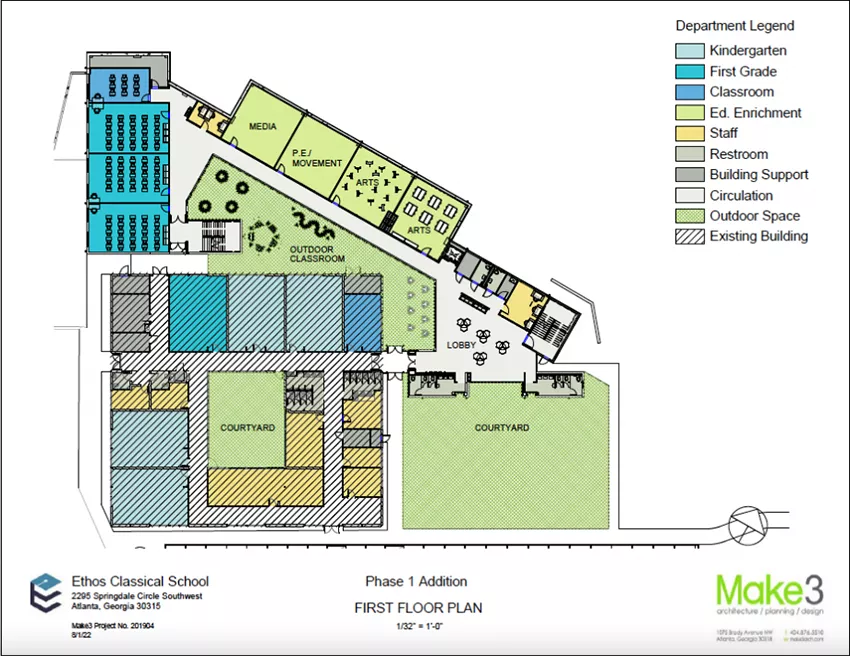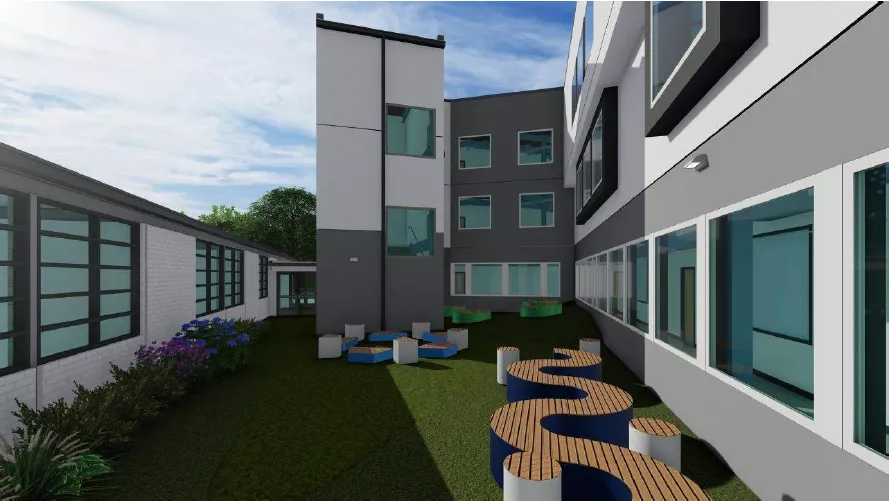In Atlanta, a tuition-free school is finally getting a permanent home — and piloting a new model for funding schools from the ground up.
Parents and students love Ethos Classical, a tuition-free public charter school in Atlanta, Georgia that serves students K through 5th grade. You could look at statistics to back this up: In a recent survey, 95% of the school’s parents gave it at least a 9 out of 10 when asked their likelihood of recommending it to another parent (anyone who’s ever been to a PTA meeting knows that kind of concordance is unusual, at best.)
Or, you could look at the school’s impact on academics to see how well students respond to the environment: 80% of the school’s students come into Kindergarten reading below their expected level, but 85% of them leave Kindergarten ahead of where they’re expected to be. Their third graders are in the 99th and 98th percentiles for growth in English language arts and math, respectively, and perform above state averages despite a majority facing the challenges of coming from a low-income background.
But the clearest testament to kids’ and parents’ passion for the school has to be the fact that, on top of those everyday challenges, they choose to stick with Ethos Classical despite the school’s lack of a traditional school building and the inconveniences that accompany that fact. The school, now in its fifth year, comprises a combination of a converted former church building and a series of trailer-like modular units spread over several acres.
“Ethos has been successful fully in spite of our facilities, not because of them — we have been working against our facilities since day one,” says Emily Castillo León, founder and executive director of Ethos Classical, noting that about 75% of the student body are taught in the modular units at any one time. “This means that we have to serve all meals in the classroom, and transport them to those classrooms. That means that in the rain, snow, sleet, children are walking outside to get to and from the restroom. It means that we have no whole-group meeting space … when we do large events, we have to stagger our attendance.”
A proper building would eliminate those challenges while better supporting what is already demonstratively stellar instruction. And that’s just what León is aspiring to build. Since the inception of the school, she’s been working with a growing team of CDFIs and public institutions who have worked to get Ethos Classical a home. And through the creative efforts of that team, that journey is nearing its end. When it’s completed, it could create a new standard model of using public funds to create, from the ground up, brand-new schools that give hope to entire communities.

The planned building layout for the new school (Photo courtesy of Ethos Classical)
Laying a CDFI framework in the Southeast
To understand how Ethos found its way to a home, and the significance of that journey, you have to understand the vision of the CDFIs involved — Low Income Investment Fund (LIIF) and the Reinvestment Fund, which has an office in Atlanta. One of the leading CDFIs in the U.S., the 23-year-old LIIF began work in California and New York, before determining that the ecosystems that support charter schools in those states were well-developed enough that LIIF should explore regions where they could have a greater impact. A market study found that the Southeast best matched their goals.
“The intent of improving access to critical resources for people of color — that demographically drove us to the Southeast. That was the first high-level reason,” says Amir Ali, LIIF’s deputy director for the Southeast region, explaining that LIIF supports educational initiatives as part of an attempt to address social determinants of health — a means toward overall equity of wellbeing. “Then we looked at multiple states in the Southeast; we looked at charter school laws.”
LIIF found that Georgia and Tennessee had laws that could support charter schools, but lacked the ecosystem to support them, according to local school associations and charter school authorizers they interviewed.
“One of the key challenges that came up in these states was, ‘We would like to authorize schools because we want to increase access to school choice, but those schools can’t find a place to locate,’” Ali says. “If they find a place to lease, the landlord will not lease to them because the landlord doesn’t understand charters. There’s no credit strength in a new charter school; they don’t have any balance sheet; they don’t have any assets.”
When schools went to commercial banks to counter these issues, according to Ali, the banks had the same response: They didn’t know how to lend to charter schools. As a result, for-profit lenders became a major source of funding for aspiring charter schools, and took a “significant chunk” of many schools’ funding in these states. This problem was particularly significant in developed, urban communities like Atlanta, where space alone could be very expensive.
So LIIF — with advice from the Racial Equity Consortium, a national collaboration of CDFIs that share insight on systemic challenges — formulated a plan. They would enter these regions, financially support the creation of new charter schools, and change the market, educating other lenders and other organizations involved in financing and building new schools on how to do so in a way that actually allowed the school to survive.
“The big difference [from California and New York] was just that lack of an ecosystem,” Ali says. “I think what it came down to was, ‘Who takes that first step in the state?”
In 2013, they moved into the Southeast market, and in 2017, they opened an office in Atlanta. They began work with the Reinvestment Fund, one of the larger CDFIs in the region. Together, they helped four charter schools obtain financing that negated their dependence on for-profit lenders.

A rendering of the new Ethos Classical school (Photo courtesy of Ethos Classical)
The funding puzzle
In 2019, The Reinvestment Fund came to LIIF, looking to provide Ethos an $18 million loan to facilitate the construction of a new 44,000-square-foot school building in South Atlanta.
“We believe that students learn best in spaces envisioned for their success, and the expansion of Ethos will provide students the capacity they need to flourish,” says Khaliff Davis, managing director of structured finance at Reinvestment Fund. “Additionally, Ethos is mission-aligned, demonstrating a commitment to racial equity while prioritizing social-emotional learning, leadership and staff recruitment, and family engagement within programming. In partnering with LIIF, we are using our financing to empower a school we have supported since its inception.”
The three-story facility has 24 classrooms, serving 624 students from kindergarten through fifth grade, as well as enrichment spaces for visual and performing arts and a full kitchen, allowing all students at Ethos to spend the majority of their time in a proper school building.
“It [means] that we get to maximize the amount of time that kids spend in classroom learning and growing their brains,” León says. “Right now, because the transitions take so long between spaces, it results in more minutes outside of class during transition times than what we would want.”
The project required a larger loan and a higher loan-to-value ratio than LIIF typically looks for: LIIF realized that the school would not be able to afford a down payment. To make the project happen, LIIF didn’t ask for one.
“We provided them a full loan-to-value of 100%,” Ali says. This allowed Ethos to purchase their current, leased school building outright, saving about half a million dollars, while beginning construction on the new addition.
That investment was worth it for LIIF because they saw in Ethos a unique opportunity to support an educator from the ground up, one that presented an unusually ideal model for an equitable school. The CDFI has created an equity scorecard that they use to measure a school’s efforts to create an equitable learning environment. They look at details ranging from hiring a bilingual staff, to hosting PTA meetings in the evenings so parents who work during the day can attend, to providing a means of after-school internet access for students who have none at home.
“It’s a very, very rigorous process. It takes three to four conversations with the school leaders to really get to multiple layers of how they approach impact,” Ali says. “Is there need in this location? And the answer was yes. Are they serving people of color? Yes. Is the quality of the education strong? Yes. Are they doing family engagement and really aligning with LIIF’s racial equity perspective? Yes. [Ethos] was one of the highest scoring schools in our impact scorecard.”
LIIF and the Reinvestment Fund recognized that Ethos’s success is in its DNA, something that came from León’s particular mission for the school. Formerly of Teach for America and trained in the founding of charter schools, León put an emphasis on a combination of rigorous academics and onboarding and training teachers, parents and students in the culture that the school seeks to foster. Teachers receive books on customer service from restaurant industry titans, while parents receive children’s books created by the school’s own principal, a celebrated author. Part of that culture was also making sure teachers had the passion to teach despite lacking a complete physical structure.
“Making that part of the culture of our school was very important, like, ‘Yep, this is going to be wild for the next five years. But we get to say forever that we were part of building this,” León says. “And part of building this is having a grittier mindset around what’s possible and how to make it happen.”
It’s a phase that León, and the CDFIs supporting her, knew was necessary. New charter schools that are dependent on loans have to start small to decrease risk for lenders, then grow rapidly to create a sustainable business model.
“In year zero, they need to have a very simple, minimal space to prove the concept,” Ali says. “And year two, they go into a slightly larger space. In year three and four, they can start thinking about having a full, dedicated building, because now they’ve proven the concept, they have enough enrollment to support a larger financing package.”
Responsible lending is important to LIIF, from both an ethical and business perspective. They have a zero-failure rate among the schools they support, which is critical in terms of obtaining funding from the Department of Education, a primary source of funding for LIIF’s loan to Ethos, as well as their work in the Southeast in general. An initial loan of $8 million from the DOE is the primary cash source for their work in the region.
“[Our success] is driven, in part, by what impact we can show to the Department of Education, who will then give us more grant money. And the impact is how many new schools have you served? How many seats have you created? How are those schools doing academically?” Ali says. “It doesn’t help us if we give a new school $10 million and then the school fails, right? It looks really badly on us. So we are very aligned with structuring the loan so the schools are set up for success.”

A rendering of the new Ethos Classical school (Photo courtesy of Ethos Classical)
Making a long-term impact
The loan to Ethos will take seven years to pay back, and Ali notes that seven-year relationship will be focused on supporting the school’s growth through both financial guidance and collaborating on making sure the school is as equitable as possible.
“Once [Ethos] closes the loan, we will continue this conversation every single year,” Ali says. “What have you implemented this year? What have you learned on this topic? Whether it’s staffing, discipline, family engagement, curriculum or incorporating social justice elements in the curriculum … We not only talk about the impact; we also talk about the credit aspect. How’s your enrollment doing? How’s your cash balance? So it’s one broad conversation where we capture all of these details.”
That relationship will also evolve and extend years into the future. LIIF will track the impact of their investment through the high school and college graduation rates of the students who attend Ethos.
“We’re really saying, ‘Okay, before LIIF was involved here, what was the graduation rate in the neighborhood? And now here’s where the graduation rate is,’” Ali says. That’s not just for the individual students, but for the overall impact on the low-income neighborhoods that LIIF is looking to support. “Studies have shown graduation rates are very strong indicators of successful outcomes.”
In the meantime, construction on the new building is halfway complete, and will have its grand opening early in 2024. And according to León, its impact will be immediate.
“[The new spaces] will ensure that we have the ability to live out our mission of a truly, fully rounded experience,” she says.
For Ali, LIIF itself has improved as well. For one, they’ve gained knowledge from León’s excellence in family engagement and academics that they can pass on to other schools.
“You know, Emily is no longer just a borrower. For me, she’s a friend; she’s actually a thought partner for us. And whenever we are looking at a school that is challenging, or we want to learn or have a different educator’s perspective, we reach out,” Ali says, adding that he sees that knowledge as an important part of their unique contribution. “We’re not experts in racial equity; we’re not experts in education, either. We are experts in incorporating a racial equity lens to lending practices.”
Already, LIIF and Reinvestment Fund are seeing a true ecosystem for financing and constructing charter schools growing in Georgia, with new lenders and builders moving into the region, and others creating new financial packages. Both CDFIs now compete to finance loans, as they intended.
“We’ll do less business in Atlanta in the next two years, but that’s okay,” Ali says. “Now we are going into other states.”

Full Article Available at: https://nextcity.org/urbanist-news/how-to-start-and-fund-a-truly-inclusive-charter-school

